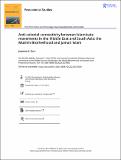Anti-colonial connectivity between Islamicate movements in the Middle East and South Asia : the Muslim Brotherhood and Jamati Islam
Abstract
With almost every part of the Muslim world having suffered from European colonisation, the roles and relations of Islamicate movements in anti-colonial history cannot be ignored. And yet, despite intellectual overlaps, mutual opposition to British colonialism, and a shared spiritual worldview, little has been written within postcolonial studies on the historical relationship between the Muslim Brotherhood in Egypt and Jamati Islam in South Asia. I explore the link between both movements as an example of anti-colonial connectivity that transcended territory. Though disconnected by geography and language, both groups were nevertheless tied by the deep connection of a shared belief system and the common experience of British imperialism. In particular, I argue their theology was not incidental but fundamental to both their anti-colonialism and their connectivity. I consider how that connectivity and solidarity evolved through time and shifting locations, reflecting the rich inheritance not just of post-colonies, but also of diasporic communities in the imperial metropole, inhabiting liminal spaces of unbelonging who often found community via these transnational movements. The purpose of the article is a recovery of history and a recognition of (at times overlooked) anti-colonial struggles and solidarities that do not fit neatly within disciplinary postcolonial norms.
Citation
Gani , J K 2023 , ' Anti-colonial connectivity between Islamicate movements in the Middle East and South Asia : the Muslim Brotherhood and Jamati Islam ' , Postcolonial Studies , vol. 26 , no. 1 , pp. 55-76 . https://doi.org/10.1080/13688790.2023.2127660
Publication
Postcolonial Studies
Status
Peer reviewed
ISSN
1368-8790Type
Journal article
Collections
Items in the St Andrews Research Repository are protected by copyright, with all rights reserved, unless otherwise indicated.

